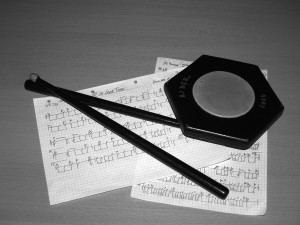“It’s taking forever to memorize these scores” and “Do you have a trick to memorize drum scores faster?” – is two sentences I’ve heard a lot from beginner (and also even from more experienced) drummers. I’m not sure faster is necessarily the way to go. I’d rather take the time needed with a lot of focus, and then of course spend the time effectively. Below I’ve made a sum up list of what has worked for me in terms of learning drum scores more effectively and safe – to allow myself to step pretty solid into a drum corp and contribute rather than being a passenger on a free ride. Maybe it’ll work for you too? Here we go.
- Learn the tune & drum-hum. Learning the basic structure and sound of the tune is something which I take time to do before learning the drum score. It helps me a lot to have something (the tune) to hang the drum score on to. As I wrote in my previous post on how to practice – I also find that drum-humming a score helps me getting the drum score in my head with the tune as one piece of music.
- One part/tune at a time – and take your time. Learning one part of a time is something that I would do when learning an MSR, whereas one tune at a time would be when learning a medley – which often would consist of more 2 parted tunes. Most importantly for me is though to take time here. For me it’s a goal, to at least learn one tune by heart after a session. I turn off everything around me and get into the drum score memorizing bubble. Nothing else matters for the time being (30 minutes, an hour, 2 hours – whatever it takes).
- Getting rid of the score as quickly as possible. This is something I do a lot. I find that the longer time I keep the drum score around, the more dependent I become of it. Therefore – I like to “throw away” the drum score as quickly as possible and trust that I know what I’ve memorized. This is something that I’ve found becomes easier by experience, the more I’ve done it over the years.

- Naming the parts. I would do this sometimes, if relevant. I would quite often do it when learning longer pieces of music such as marches, strathspeys and reels of an MSR. There would be “the part that starts with the big roll” or “the one that starts with the single run” or whatever. It helps me keep the structure of the drum score in my head for a quicker way to get the drum score auto-piloted.
- Spend the time. Logic. To me this is the pure logic: I spend the time (a lot and whatever I need) when I get the material, to get it memorized – and most importantly – I extend the time of enjoyment of playing the drum score. To me, there’s nothing more depressing or demotivating (mostly for myself, but also for everyone else) than to be sitting around not knowing a drum score for weeks or months.
- Learning and incorporating dynamics when memorizing the drum score. Not only does this help me to memorize the score, it also helps me autopilot my dynamics and control for later on, when playing the drum score with the drum corp.
- Chips. Learning my part. This is something I’d encourage everybody to do when memorizing a drum score as a corp player. It has helped me over the year to be able to step into a drum corp – straight off the plane – and play along. When learning and memorizing a drum score I would learn and only memorize my part. That means also learning the timing of breaks in between chips. By training the breaks and keeping the time of the tempo as well, I feel well prepared to play with the drum corp later on. On another note I think that this is something that drum corps could really use a lot and benefit from, when the LD is not around. I feel that playing the chip parts and repeats only, without anyone playing the leading parts, helps getting the flow of the chips right.
These were some of my thoughts on how to memorize a drum score – sharing some of the stuff that has worked for me on this matter over the years.
